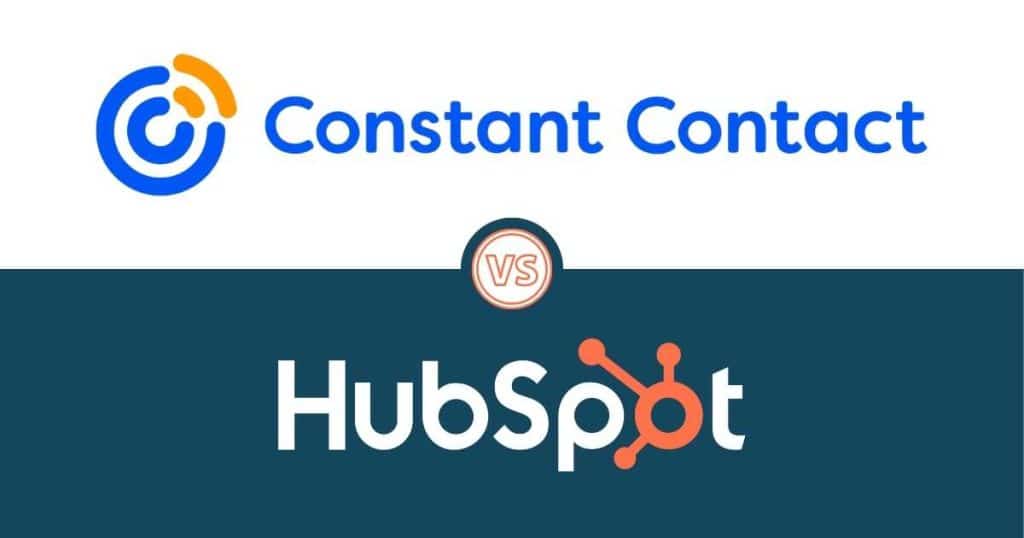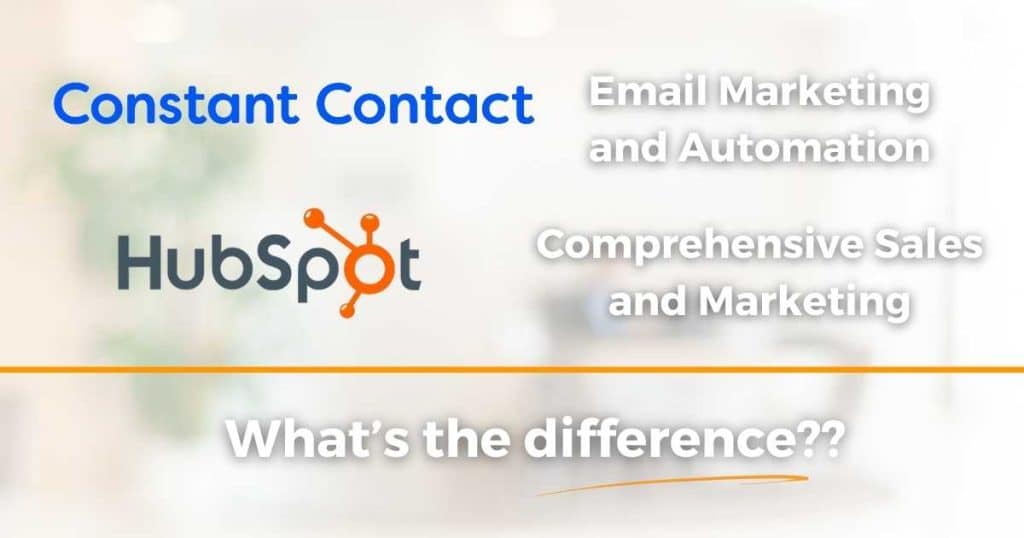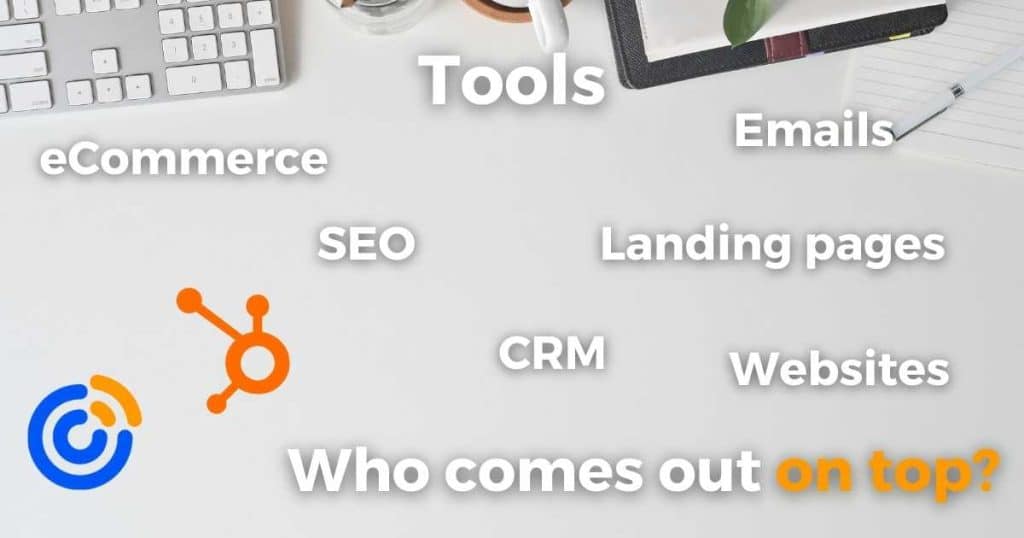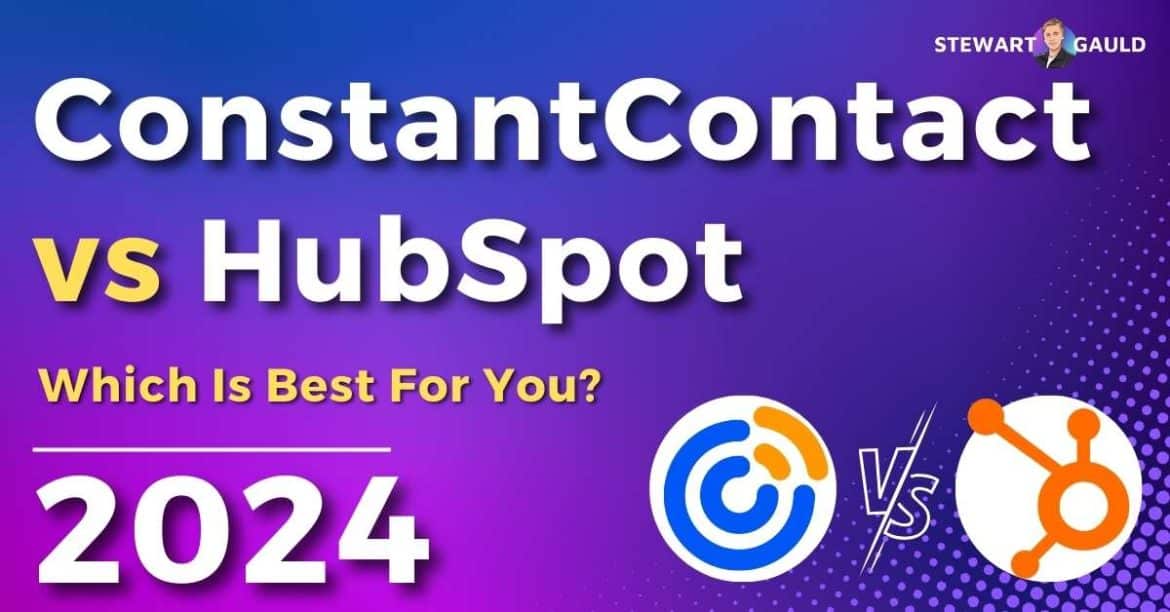In the competitive online marketing world, two dominant players are always at the top of their game: Constant Contact and HubSpot.
HubSpot has long been hailed as the go-to solution for businesses seeking a comprehensive sales and marketing platform.
However! Constant Contact is one of the oldest email marketing tools on the market.
But does older necessarily mean better? Or do HubSpot’s features and capabilities outshine Constant Contact?
If you’re considering using Constant Contact or HubSpot for your small business but don’t exactly know what they are and how they differentiate, keep reading!
Constant Contact vs HubSpot – which should you use?
Read more: 7 Best CRM Software For Small Business.
Quick Summary
- Constant Contact is primarily an easy-to-use email marketing platform, whereas HubSpot combines sales, CRM, and marketing tools.
- HubSpot offers a feature-rich free plan and many different paid plan types. Constant Contact has just three simple plans (but no free plan).
- HubSpot is better for small-large growing teams focused on scalability, and Constant Contact is better for newbies or small businesses.
Constant Contact vs HubSpot 2024

Which of these two powerhouse platforms reigns supreme in helping you streamline your marketing, sales, and customer service processes?
Prepare yourself for an epic showdown as I delve deep into the features and functionalities of Constant Contact vs HubSpot.
No matter what, you can be sure to elevate your marketing game with Constant Contact and HubSpot!
Read more: Top 5 Best FREE Email Marketing Software For Small Business.
What Are They? Constant Contact vs HubSpot
Both Constant Contact and HubSpot offer many tools and capabilities to help businesses streamline their marketing efforts.
Constant Contact is an email marketing platform that offers features like customizable email templates, contact management, and automated email campaigns.
And after almost three decades in the game, there’s a reason why Constant Contact is still so successful!
With an easy-to-use interface and a solid foundation for business owners, Constant Contact is perfect for beginners who are serious about driving their email marketing strategies.
In comparison, HubSpot is known for being a dynamic and easy-to-use CRM (customer relationship management) solution.
However, HubSpot is so much more than that!
Offering multiple marketing, sales, and service solutions, HubSpot helps you manage your customers, leads, and prospects on one centralized platform.
You can build sales pipelines, engage in email and social media marketing, set up meetings, create websites, and so much more with HubSpot.
HubSpot really is a one-stop-marketing shop!
Read more: How To use HubSpot CRM?
What Are The Differences Between Constant Contact vs HubSpot?

While Constant Contact and HubSpot share many commonalities, there are a few key differences.
The main difference lies in the focus of each platform.
Constant Contact offers supplementary CRM, eCommerce, and omnichannel marketing features, but their primary focus is email marketing and automation.
HubSpot provides a broader range of marketing capabilities, including email marketing, project management, and website creation.
But HubSpot’s main attraction is centered around its contact, lead, and sales management through its easy-to-use CRM.
HubSpot’s feature set certainly surpasses Constant Contact, but Constant Contact’s simplicity is where it shines!
So, with that said, let’s get into the nitty gritty of each platform.
Read more: Constant Contact Alternatives.
Ease Of Use
Constant Contact is known for its simplified and user-friendly experience, particularly for small business owners with limited technical knowledge.
The platform’s streamlined user interface guides new users on how to use their email marketing workflows with easy step-by-step instructions.
And the clean layout, familiar interactions, and detailed tooltips ensure that even marketing beginners can quickly grasp the basics!
The intuitive drag-and-drop editor makes creating emails, websites, signup forms, and contact management a breeze.
Additionally, all essential features, like templates, campaigns, and reports, are easily accessible through the left vertical toolbar within the dashboard.
On the other hand, HubSpot’s comprehensive suite of inbound marketing and sales tools naturally presents greater complexity than Constant Contact.
For example, making your way between the various ‘Hubs’ for marketing, sales, services, and operations may appear overwhelming at first glance.
However, once you take the time to get past the initial learning curve, HubSpot’s menus and layouts within each module are well-organized and follow a simple drag-and-drop interface.
HubSpot’s learning curve is undoubtedly higher than Constant Contact; however, the tools are reasonably intuitive when explored individually.
Winner = Constant Contact.
Read more: Constant Contact Pros and Cons.
Pricing
Constant Contact
Constant Contact’s plans are much simpler than HubSpot’s, with just three plan options:
● Lite: $30 per month (1000 contacts).
● Standard: $55 per month (1000 contacts).
● Premium: $110 per month (1000 contacts).
All plans come with marketing CRM and integrations. But the ‘Lite’ plan doesn’t come with automation or segmentation.
HubSpot
HubSpot’s plans are structured into different hubs (CMS, sales, marketing, operations, and CMS), and each hub comes with a range of pricing tiers.
This can confuse new users or teams that don’t know what type of hub they require!
I always suggest the free plan for small teams, which has a good range of free marketing, sales, service, CMS, operations, and commerce tools.
But if you want a bit more, I’d go with the CRM Suite plan, which includes a range of marketing, sales, CMS, service, and operations tools.
Prices for the CRM Suites are as follows:
- Free: $0
- Starter: From $20 per month.
- Professional: $360- $800 per month.
If you only require marketing services such as email marketing, landing pages, live chat, and forms, I advise checking out the paid marketing plans (prices start from $18 per month).
Additionally, you can always ‘Build your own bundle’ to build a plan best suited for you!
Considering HubSpot offers a free plan with a wide range of features, this win goes to them!
Winner = HubSpot.
Read more: ActiveCampaign vs Constant Contact.
Constant Contact vs HubSpot Tools

Constant Contact is primarily used as an email marketing tool, but that’s not all it offers!
Here are some key tools you’ll get with Constant Contact:
● Email, social media, and SMS marketing.
● Marketing automation.
● Contact management.
● A/B testing.
● eCommerce marketing.
● Landing pages.
● Third-party integrations.
● Basic reporting and SEO tools.
Okay, so we’ve established that HubSpot offers a wider range of features and functionality compared with Constant Contact. But what does it offer exactly?
Key tools include:
- Email, social media, and SMS marketing.
● Comprehensive CRM.
● Lead nurturing.
● Landing pages.
● Website creation.
● Meeting scheduler.
● Integrations.
● Live chat.
● Built-in SEO tools.
● Video hosting.
● Predictive lead scoring.
● In-depth reporting and tracking.
And so much more! HubSpot really does it all, hey?
So, with that said, let’s take a look at some of the key features of both platforms.
Winner = HubSpot.
Read more: How To Create a Sales Pipeline With HubSpot.
Constant Contact vs HubSpot Key Features

Customization And Templates
Constant Contact has hundreds of professionally designed email templates so users can effortlessly and quickly create visually appealing and engaging emails.
Template categories are organized into the following groups:
- Promotions.
- Newsletters.
- Welcome series
- Seasonal.
The drag-and-drop template editor allows you to customize colors, fonts, and layouts with just a few clicks and add images, buttons, dividers, and social media icons – all without code!
All templates are mobile-responsive right from the start, and on higher plans, you can do fancy things like split tests and personalized email subject lines.
Similarly, HubSpot offers hundreds of responsive pre-made templates catering to various use cases.
The difference between Constant Contact vs HubSpot, of course, is that HubSpot’s templates are much more varied.
From emails to sales pipelines, websites, and everything in between, there’s a template for you!
Simply filter your options based on template type, industry, or design, and from there, swiftly find a template tailored to your specific needs.
Flexible editing tools within HubSpot let you customize everything from your chosen template’s structure, content, style, and settings.
And everything from column widths to button colors can be easily adjusted (without the need to touch any code!)
HubSpot also includes free images and graphics to add a visual touch to your templates.
While Constant Contact focuses on making it slightly easier to customize polished templates, HubSpot’s styling flexibility and wide range of templates have the cutting edge!
Winner = HubSpot.
Read more: HubSpot’s Free Website Builder Review.
CRM
In addition to email marketing, both tools offer dynamic contact and deal management solutions.
Constant Contact’s contact and lead management features are basic, but do the job.
You can easily create segmented lists to target specific groups, ensuring your messages reach the right audience and track contact engagement to tailor your campaigns.
And with Constant Contact, you can view and manage all your deals in real time through easy-to-use sales pipelines.
You can track team or individual progress, stay on top of your deals, and easily forecast upcoming revenue, all within Constant Contact.
That’s right, no more juggling between multiple platforms!
However, HubSpot’s CRM tools are simply unmatched.
With HubSpot, you can manage your contacts, track interactions, and gain a holistic view of your customer relationships like never before!
Designed for larger businesses, HubSpot’s CRM offers the essential features mentioned earlier and more advanced capabilities like:
● Lead scoring.
● Meeting scheduling.
● Predictive lead scoring.
● Sales forecasting.
Plus, there’s also a dedicated mobile app for on-the-go management.
While Constant Contact and HubSpot offer CRM capabilities, HubSpot’s CRM stands out as the more sophisticated and scalable option, providing a seamless end-to-end sales process.
Winner = HubSpot.
Read more: How To Set Up HubSpot CRM.
Automation
Constant Contact’s marketing automation focuses on providing users with simple yet effective email automation triggers.
Some triggers include:
● First purchase.
● Welcome emails.
● Lead nurturing sequences.
● Abandoned cart.
● Date-based sequences.
While you can set up multi-step triggers in Constant Contact, there are limitations.
On the other hand, HubSpot offers extensive automation capabilities, allowing you to automate repetitive tasks seamlessly across multiple hubs and workflows.
With HubSpot, set up automation workflows for tasks like sending emails, adding/removing contacts from lists, and building workflows based on form submissions, website visits, and email opens.
Additionally, HubSpot’s automation capabilities involve streamlining your sales procedures, helping schedule meetings, and facilitating lead scoring.
Read more: How To Create a Landing Page in HubSpot.
Segmentation
With Constant Contact, you can create targeted customer segments based on demographics, interests, engagement data, and more.
These segments mean you can send targeted email campaigns to your audience with the hopes of driving engagement and performance.
Key features include an intuitive segment builder, contact tagging, if/then contact filtering, up to 5 segmentation rules, and integration with Google Analytics.
Segmentation within Constant Contact is simple to set up and sufficient for small teams just requiring email marketing segmentation.
However! They’re definitely not as robust as HubSpot’s.
Segmentation within HubSpot powers personalization across your emails, landing pages, workflows, and more.
HubSpot’s capabilities include:
● One-click behavior generated groups.
● CRM property-based segments.
● Smart lists with dynamic filters.
● Email and workflow targeting.
● And more!
Although Constant Contact puts up a good fight, I believe HubSpot’s advanced and customizable segmentation powered by its impressive CRM is the winner here!
Winner = HubSpot.
Read more: 6 Best HubSpot Alternatives.
Constant Contact vs HubSpot Customer Support

ConstantContact’s support is pretty impressive, with 24/7 email and chat support as well as an extensive library of tutorials and guides.
Phone support is available on weekdays, and additionally, you can join their vibrant Facebook community with over 200k followers.
HubSpot also prioritizes customer support with live chat support, email ticketing, comprehensive online academy training, and a library of marketing guides & templates.
The only downside to HubSpot when it comes to support is the fact that phone support is available on paid plans only.
Like ConstantContact, HubSpot offers online help resources through its knowledge base and blog.
Winner = Draw.
Read more: How To Use HubSpot CRM App.
Constant Contact vs HubSpot Who Are They Best For?

So, now that we’ve explored the ins and outs of both tools – which should you pick?
Well, the answer is quite simple, really!
If you’re looking for a simple, affordable, user-friendly email marketing solution, Constant Contact is a great option.
It offers streamlined marketing automation features and guided workflows, perfect for small business owners without technical expertise!
With Constant Contact, you can easily set up professional campaigns, collect contact lists, and view campaign analytics without any unnecessary complexity or steep learning curves.
However, if you’re seeking a more comprehensive solution that integrates inbound marketing and sales, I highly recommend you consider HubSpot!
Its all-in-one marketing hub combines website creation, email marketing, social media, CRM, and more.
HubSpot is ideal for growing companies ready to take their marketing efforts to the next level!
Plus, you can’t go past the incredible free plan, right?
Stews Final Thoughts
And that completes this Constant Contact vs HubSpot comparison!
So, what do I think?
Well, both platforms excel in their respective services, and determining which is better for you ultimately depends on your team.
Here’s my advice: Take a moment to consider your business goals and priorities.
If your main focus is growing your email list and generating more leads, you may prefer Constant Contact’s simplicity.
On the other hand, if managing and enhancing customer relationships is a top priority, HubSpot is the superior choice.
Now, it’s up to you to decide: Constant Contact vs HubSpot?

